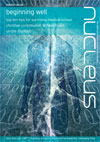You've just enjoyed a discussion of autonomy in an ethics seminar. During the coffee break your friend asks: 'You Christians seemed to have a lot to say in that session. What do you actually believe?' You've got five minutes. What will you say?
The motto 'Be Prepared' is important not only at scouts (and in medicine), but it is also vital in evangelism. Many Christians memorise a 'gospel outline' to help — much like the way medics use mnemonics. But there are hundreds of gospel outlines around. Which one do you learn?
what makes a good gospel outline?
start in the right place
Many outlines assume too much — beginning with sin, for example, assumes not only that the listener knows God exists, but also understands his character. Start further back. Affirm God as real, and briefly describe him.
be Christ-centred
All too often Jesus features merely as a mechanism to solve a moral conundrum for a God who has to work out how to reconcile his mercy with his justice. We can't ask people to trust Jesus if we don't tell them about him.
calling for repentance
The term 'repent' is repeatedly used in the New Testament. (1) We must explain what 'repent' means, however unfashionable.
the cross central, but not first
The cross is central, but other things must first be explained for it to be understood. The important fact is not that someone was crucified. What really matters is who was crucified. People are saved when they trust in 'Jesus Christ and him crucified'. (2)
faithfulness about judgement
If judgment is ignored, what is the point of the gospel? If we are not going to be called to account for how we have lived, why do we need forgiveness? Without the reality of judgment, any logic in the gospel collapses.
why this outline?
The five-points are succinct and adaptable; use them to build a one minute answer, or structure a whole hour's lecture (if anyone will listen for that long!). Below I suggest some content for each part:
1. God (ruler)
God exists. He created the universe, 3 and sustains its very existence. (4) Humans were made for a relationship with him. God is holy (5 ) — that is, he is pure, perfect, and unable to relate to that which is not holy. We can know him because he has revealed himself to us through his Son, Jesus Christ. (6)
2. man (rebel)
God created humans to be holy, (7) like him. But none of us consistently live with God as our ruler and creator. (8) We assume (wrongly) that we are to govern our own lives. This results in either wilful disobedience of God (sin), or plain ignorance of him. We deserve God's judgment, (9) and have no right to be in his presence, or live in his kingdom.
3. God (rescue)
God's love for us means that — despite our rebellion — he wants to rescue us from this judgment. (10) Only someone who has always lived consistently with God's commands could take that punishment in our place — everyone else deserves punishment. (11) Jesus is the only person to have lived a perfect life, free from rebellion against God. (12)
Sent to earth by God, Jesus' three years of public ministry culminated in his execution on a cross. In dying, he received the punishment we deserved for our rebellion against God. On the third day after his death, Jesus came back to life with a new, transformed body. It was not just a 'spiritual' resurrection.
Jesus showed that he was victorious over the power of sin. Jesus was given all authority in the universe by God. He is Lord over all things. He has taken the punishment we deserve, giving us an offer of forgiveness that demands a response.
Jesus' teaching invites us to repent (turn from our rebellion against God) and believe in him (to trust that he is God's Son, and live in obedience to him).
4. what if I don't (rejection)
If we ignore or reject Jesus, we remain banished from God's presence because of our rebellion. Nothing that we can do will repair our broken relationship with God. We will receive the judgment we deserve, and be cut off from God forever, in hell.
5. what if I do (reconciliation)
If we repent and believe that Jesus has taken our punishment upon himself, God forgives our wrongdoing. He treats us as if we had never rebelled in the first place! We are part of God's Kingdom, as we were made to be. God gives us the Holy Spirit, who enables us to live a life pleasing to him. The Holy Spirit is also a 'deposit' — a guarantee that we will spend eternity with God, adopted as his children.
We must choose soon whether to accept God's offer, since only God knows when Jesus will return, and tomorrow may be too late.
how to use it
This outline could help in everyday conversation; or could be used by a speaker at an event. The individual sections help answer more specific questions. You might not use
the whole outline every time. To learn more, come along to a Confident Christianity day conference run by CMF — ask your local group leaders to organise one.
Confident Christianity
Do you ever feel that your evangelism skills could be honed? Do you long to get the gospel message through to your friends but struggle to communicate? Or perhaps you worry about the difficult questions that might get thrown at you should you share your faith. This course is interactive, fun and highly relevant to students.
1. Acts 2:38, 3:19; Revelation 2:5
2 1 Corinthians 2:2
3. Genesis 1:1
4. Hebrews 1:3
5. Leviticus 19:2
6. Hebrews 1:1-3
7. Genesis 1:27; 1 Peter 1:16
8. Romans 3:23
9. Romans 6:23
10. 1 Timothy 2:3-4
11. 1 John 1:8
12. Hebrews 4:15
































